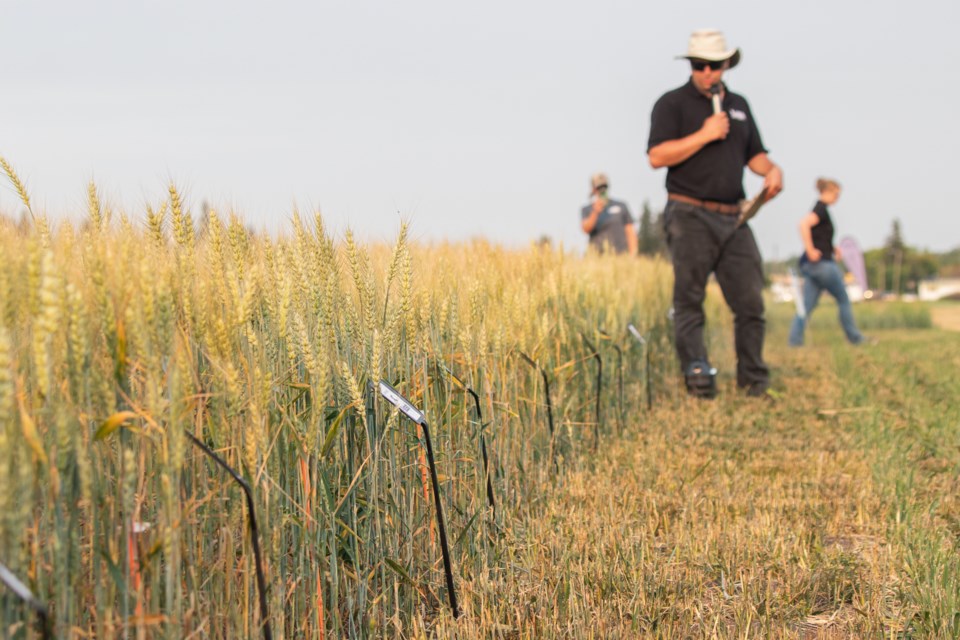FORT KENT – The Lakeland Agricultural Research Association (LARA) held a field tour at its Fort Kent location on July 31 to share this year's research findings with local producers.
LARA is a non-profit research and extension organization that was formed in 1991. The annual field tours conducted in various locations in the Lakeland, including the one in Fort Kent, are part of LARA’s ongoing efforts to make agricultural knowledge more accessible to farmers in northeast Alberta, according to Alyssa Krawchuk, executive director at LARA.
"A huge part of what we do is extension and there tends to be a gap in research where there's great work being done, but it's not reaching the hands of the producers that can actually implement it on their farm," said Krawchuk.
"So, that's what this event is for, [it] is bringing that research that's happening and giving it to the producers, [and] putting it in hands of the producers that can actually utilize it," she said, adding many of LARA's research projects are funded by Results Driven Agriculture Research (RDAR).
One of the research projects highlighted during the tour involved underseeding clover into cereal crops used for silage. The goal is to improve the quality of the leftover forage so that it can be grazed later in the season.
“Producers around here are making silage, but then they have stubble at the end of the year that maybe they can graze, [or] maybe not,” said Krawchuk.
By planting clover beneath the main crop, the hope is to add forage value and extend the use of that land.
“You’re adding quality to that forage so that producers can then utilize that field after silage to actually graze their cattle into the fall,” she said. “And not have to feed as soon.”
The idea, she added, is to help producers stretch both their land use and feed supply later into the year.
Agriculture experts were also present to speak to producers during the Fort Kent tour, including Dr. Christina Eynck with Camelina and Carinata Breeder, Agronomy Specialist Keith Gabert with the Canola Council of Canada, as well as Dr. Michael Harding, Crop Assurance Lead with Alberta Agriculture and Irrigation.
Harding spoke on the current state of crop diseases affecting agriculture in Alberta.
Crop disease
Unusual weather patterns are raising the risk of crop diseases across Alberta this year, according to Harding. He said precipitation levels this summer created ideal conditions for several crop diseases not typically in some parts of the province.
“Where I work in Brooks, we’re seeing a lot of things we don’t normally see,” due to precipitation in July, "and normally we don't get much of that," he said.
Among the diseases causing concern are fungal leaf spots, bacterial leaf streak, wheat streak mosaic, and Fusarium head blight. While not all are relevant to the area this season, Harding said that farmers should pay attention to how quickly disease patterns can shift with environmental changes.
Fungal diseases are the most common in cereals and can be managed with crop rotation, resistant varieties, and well-timed fungicide use. Bacterial diseases, such as bacterial leaf streak, are harder to manage due to the lack of bactericidal sprays and resistant varieties.
Harding also warned about virus-related diseases like barley yellow dwarf, which is spread by aphids, and wheat streak mosaic, which is transmitted by mites. Management strategies include avoiding early seeding of fall cereals that allow for a “green bridge” between crops, which are conditions that enable mites and viruses to survive between seasons.
He recommended producers take advantage of tools like the Prairie FHB map and the Alberta Climate Information Service to assess Fusarium risk and time fungicide applications appropriately.
“I’m going to go out on a limb and say we’ll see higher levels of Fusarium head blight in Alberta this year,” Harding said. “Maybe not here [in the Lakeland], but for much of the province," due to wet conditions during flowering, he explained.
Harding also suggested looking to the Prairie Crop Disease Monitoring Network, which provides real-time alerts and resources for managing regional disease outbreaks.
LARA's next field tour will be in Mallaig on Aug. 7 from 10 a.m. to 3 p.m. with the tour set to begin at the Mallaig Legion Hall.
Another event open to producers and the public is scheduled for Aug. 13 at Flat Lake Hall, focused on regenerative agriculture and soil health.



